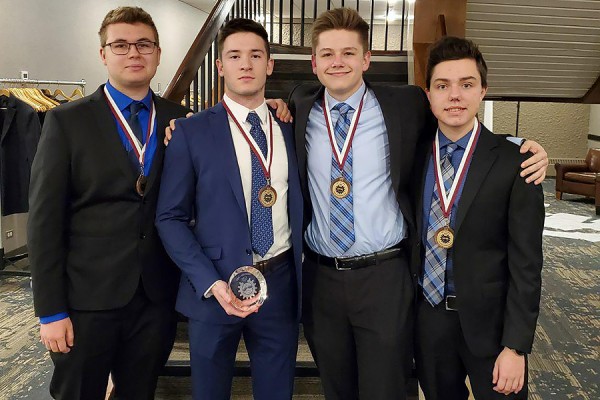 UWindsor chemistry professor John Trant is working with local industry to produce hand sanitizer.
UWindsor chemistry professor John Trant is working with local industry to produce hand sanitizer.
University of Windsor chemists have teamed up with three local businesses to bring a made-in-Windsor-Essex hand sanitizer to market.
UWindsor researcher John Trant is working with Wolfhead Distillery; InnerSeasonings International, maker of the TBQ line of sauces; and Peak Processing, a local maker of edible and topical cannabis products. Dr. Trant is securing the ingredients he needs to make the product in short supply globally because of the COVID-19 pandemic.
Trant intends to use an ethanol-based by-product of the distilling process as the main ingredient in his formula. He’ll need additives to give the product a gel-like consistency and glycerine or propylene glycol to protect the skin from the harshness of the disinfectant.
“We are going to customize the formula,” Trant said. As luck would have it, one of the post-doctoral fellows in his lab, Fred Shahbazi, is a cosmetics chemist.
“Dr. Shahbazi has the background and knowledge to pull this off pretty quickly,” said Trant. “We think it’s pretty straightforward.”
He said the most difficult part of the process will be adhering to social distancing protocols, forcing the researchers to take turns working in the lab.
The bottling will be done at Peak Processing in Tecumseh. The processing plant can mix 8,000 litres of the product at a time and has a cosmetic-filling line up for the task, Trant said. His lab will work with Peak Processing’s chief scientific officer Justin Binder on mixing samples and getting the product ready for market before bottling a gel-form on site.
The hand sanitizer project is the brainchild of Helena Racovitis, president of InnerSeasonings. She reached out to the University hoping to collaborate.
While she initially offered up the bottling line at her Erie Street plant, Racovitis will instead contribute bottles and help source ingredients. She has worked on getting regulatory approvals and to secure funding.
The intention is to offer the hand sanitizer on a cost-recovery basis, first to local healthcare facilities.
“The use will be local,” Racovitis said.
Trant had an existing relationship with Wolfhead Distillery, helping owner Tom Manherz with the formulations of the company’s small-batch whisky.
Manherz has offered Trant his supply of “heads and tails,” the captured liquid that boils off at the beginning and the end of the distillation process.
That liquid is usually either disposed of or sold for finer distillation.
Wolfhead will bottle a liquid form of the sanitizer.
Chris Houser, dean of the Faculty of Science, sees this as part of the faculty’s Extension Science program, developed to support collaborations with local industry. He said he leapt at the opportunity to lend assistance in response to the COVID-19 pandemic.
“Extension Science is about building research and industry partnerships and opportunities for knowledge transfer,” Dr. Houser said. “We want to make sure that we are doing what we can to support the Windsor-Essex community.”
K.W. Michael Siu, UWindsor’s vice-president, research and innovation, said the hand-sanitizer project is an example of how the institution’s expertise can benefit the local community.
“The University has a history of collaborating with business and industry partners for product development,” said Dr. Siu. “I am delighted that we are able to translate our knowledge into a useful and high-demand product. This is an exemplary collaboration that helps build viable, healthy and safe communities.”
—Sarah Sacheli




